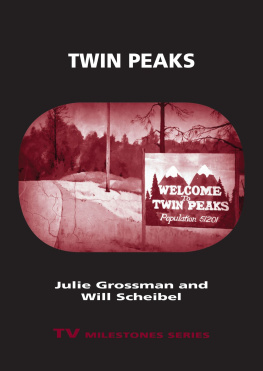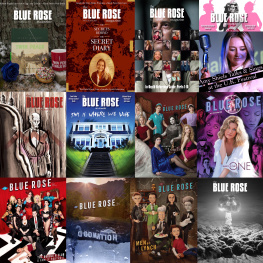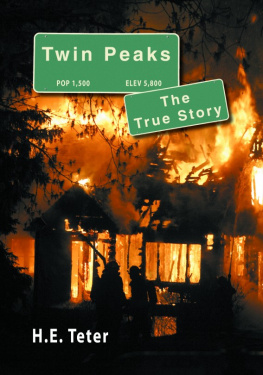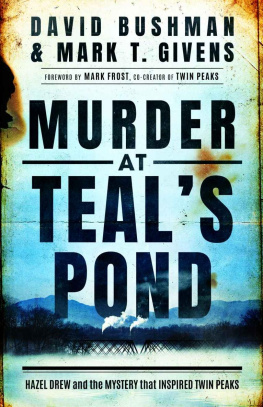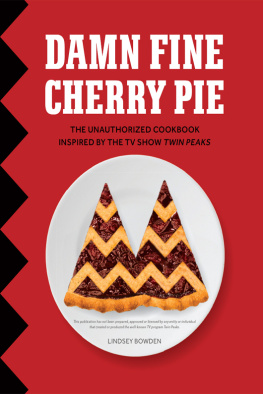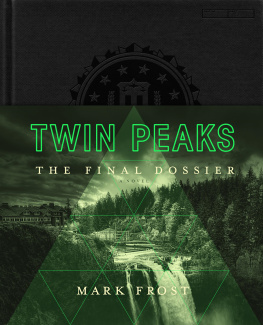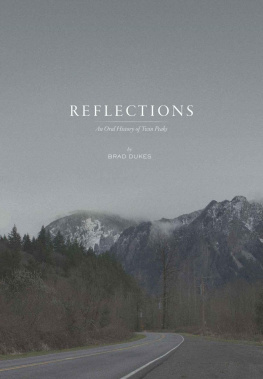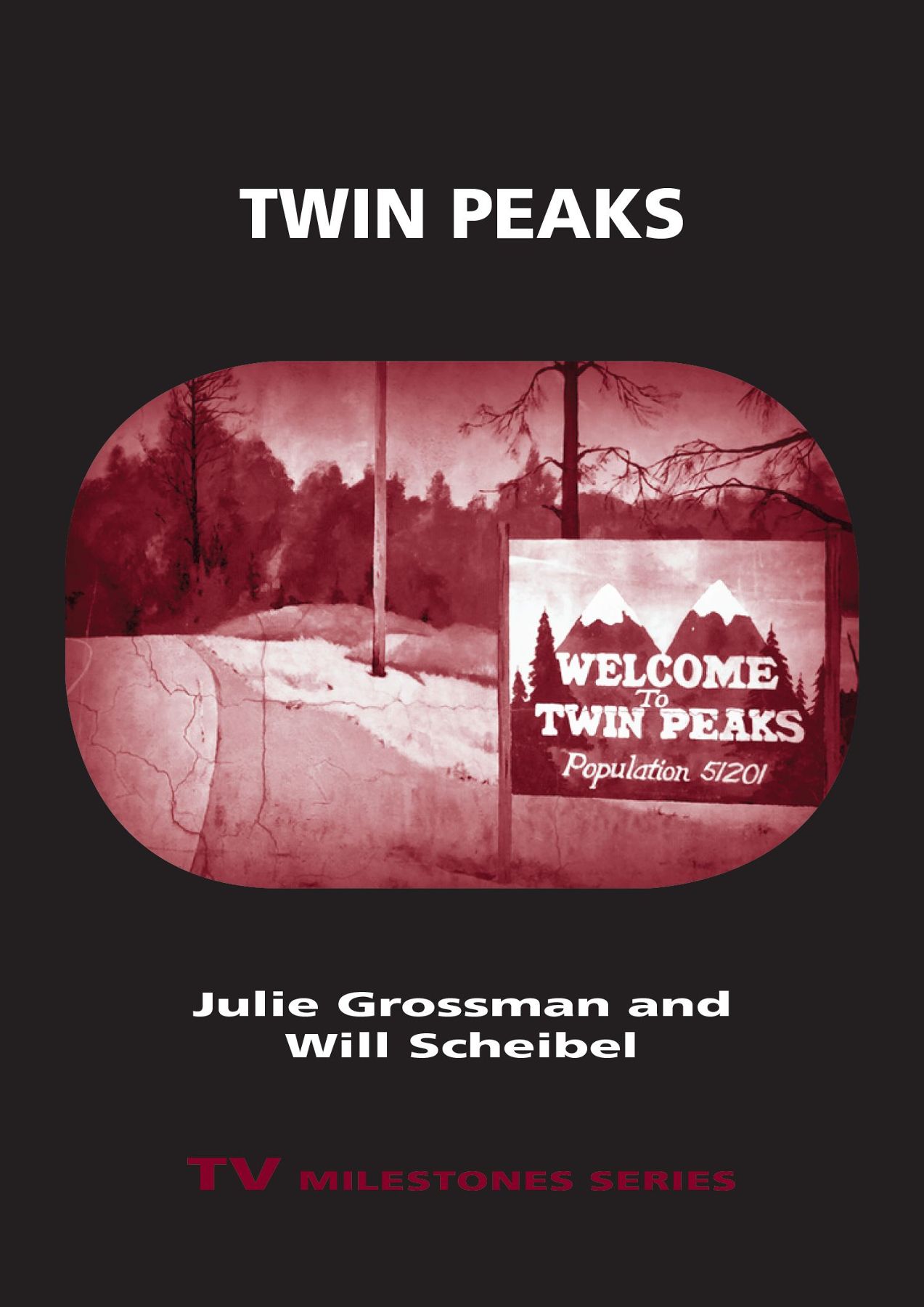
Twin Peaks
TV Milestones Series
General Editor
Barry Keith Grant, Brock University
TV Milestones is part of the Contemporary Approaches to Film and Media Series.
A complete listing of the books in this series can be found online at wsupress.wayne.edu
Twin Peaks
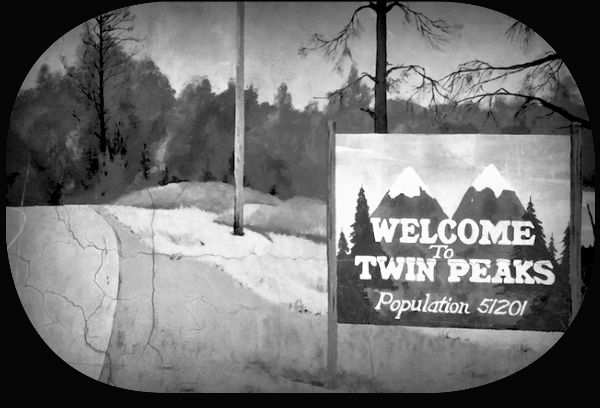
Julie Grossman and Will Scheibel
TV Milestones Series

Wayne State University Press Detroit
2020 by Wayne State University Press. All rights reserved. No part of this book may be reproduced without formal permission.
ISBN 978-0-8143-4622-8 (paperback)
ISBN 978-0-8143-4623-5 (e-book)
Library of Congress Control Number: 2019942120
Wayne State University Press
Leonard N. Simons Building
4809 Woodward Avenue
Detroit, Michigan 48201-1309
Visit us online at wsupress.wayne.edu
This book is dedicated to Phil Novak and Andrea Scheibel, who live with us in the absurd mystery of the strange forces of existence.
Contents
I t was a pleasure to work with Wayne State University Press and especially Marie Sweetman, our acquisitions editor, whose warmth and expert guidance helped us immeasurably through the publication process. Annie Martin, the editor-in-chief, was our first contact at the press and pointed us in the right directions. Barry Keith Grant, the series editor of TV Milestones, and our anonymous readers offered useful insights that were important to our revisions. The Noreen Reale Falcone Library at Le Moyne College and the Ernest Stevenson Bird Library at Syracuse University aided us in conducting research together in Syracuse, New York. Our department chairsat Le Moyne, Maura Brady in English and Michael Streissguth in Communication and Film Studies, and at Syracuse, Erin Mackie in Englishsupported our work on this project. Will would also like to thank the College of Arts and Sciences at Syracuse for granting him a semester of sabbatical leave. The students in our classes on film noir and Twin Peaks shared in our fascination with this series as both scholars and fans. We were able to present portions of chapters at conferences organized by the Association of Adaptation Studies, the Literature/Film Association, and the Modernist Studies Association. Agents Discenza and El Younsi assisted in our research, while David Israel (the CEO of TwinPeaksTour.com) drove us to filming locations in Washington and gave deeply knowledgeable commentary. In addition, we are grateful to the following friends and colleagues, some of whom are Twin Peaks fans themselves and all of whom provided encouragement and fun distractions as we wrote: Amy Breiger, Steve Cohan, Bryan Cole, Kelly Delevan, Matt Fee, Jim Fleury, Mike Goode, Eric Grode, Roger Hallas, Jim Hannan, Chris and Kate Hanson, Tom Leitch, Linda LeMura, Joe Marina, Kyle Meikle, Barton Palmer, Jolynn Parker, Kendall Phillips, Ann Ryan, Eevie Smith, Matt Spitzmueller, Kate Costello-Sullivan, Zachary Snow, Tim Sullivan, Farha Ternikar, Travis Vande Berg, Con Verevis, Kim Waale, Patrick Williams, and Bob and Dawn Wilson. Special thanks to William Twede from Twedes Caf in North Bend, Washington for great conversation and being an ally of this project.
A Short Production and Reception History
O n Sunday, April 8, 1990, the day the Twin Peaks pilot premiered on ABC, the New York Times ran a full-page advertisement with a giant pull quote from a review in the British luxury lifestyle magazine Connoisseur: Twin Peaksthe series that will change TV. Quotes followed from seven other reviewers making similar pronouncements based on advanced screenings of the pilot (Advertisement for Twin Peaks H30). The series has since been credited with influencing the science fiction-FBI procedural The X-Files (Fox, 19932002), the myth-building mystery Lost (ABC, 200410), and the detective drama The Killing (AMC, 201113; Netflix, 2014) about the ripple effects of a crimea murder-of-girl-next-door-with-secret-sordid-life, no lessin the Pacific Northwest. One list cites these in addition to seventeen other titles (Tobias et al.). Episodes in series such as The Simpsons (Fox, 1989present) and Sesame Street (PBS, 1969present) have spoofed and paid homage to Twin Peaks, ensuring its canonicity in popular culture. As the New York Times advertisement illustrates, though, ABC actually presold the series as a television milestone.
Initially, the network reaped the benefits of such a promotional campaign (and the word-of-mouth marketing it generated). When the two-hour pilot aired at 9:00 p.m. EST, an increasing number of viewers tuned in every half hour, reaching a total audience of around thirty-five million (a 33 percent market share, or a third of the people watching television from 9:00 to 11:00 p.m.) (Hughes 118). A midseason replacement, the first season of Twin Peaks ran for seven episodes on Thursdays at 9:00 p.m. opposite Cheers (NBC, 198293), part of NBCs formidable Must See TV lineup, and Episode 1 garnered the highest ratings ABC had seen in four years during that time slot (Carter D8). ABCs senior vice president of research partly attributed its success to the water cooler syndrome (i.e., around the office watercooler, people will talk about the previous nights episode of a memorable series) (D8).
Cocreators Mark Frost and David Lynch first met in 1986 through their mutual agent, Tony Krantz. Prior to developing Twin Peaks, they wrote a script for a feature film titled Venus Descending, an adaptation of Anthony Summerss book Goddess: The Secret Lives of Marilyn Monroe (1985), but United Artists terminated the project, anxious about its implication of Bobby Kennedy in Monroes death (Lynch and McKenna 24142). Next was a comedy for De Laurentiis Entertainment Group starring Steve Martin and Martin Short titled One Saliva Bubble, which Twin Peaks contributing writer Robert Engels later described as a film about an electric bubble from a computer that bursts over this town and changes peoples personalities (Rodley 155). Six weeks before shooting started, Dino De Laurentiis informed them that the company was bankrupt and being dissolved (Lynch and McKenna 243). Finally, Frost and Lynch pitched a series to NBC about FBI agents hunting down the survivors of the mythical sunken continent of Lemuriahence the title, The Lemurians. While the network wanted them to make it as a film, Lynch felt it would only work as a series, and The Lemurians never went any further (247).
Lynch claims that the idea for Twin Peaks came to him and Frost, sitting in a Du-pars coffee shop in Los Angeles, with the image of a body washing up on the shore of a lake (Rodley 157). After completing a first draft of the script for the pilot, they pitched Twin Peaks to ABC in December of 1988, calling it Northwest Passage (a title that already belonged to a 1940 film adaptation of Kenneth Robertss historical novel of the same name set in the French and Indian War). Shooting the pilot commenced in February of the following year (Hughes 106). Part of the inspiration derived from the 1908 murder of Hazel Irene Drew in the town of Sand Lake, New York, where Frost spent his childhood summer vacations and heard local legends about the unsolved case (Bushman and Givens E1).
Next page
